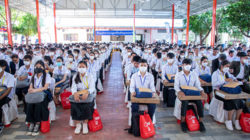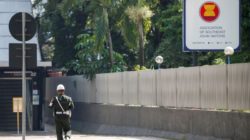PHNOM PENH, Cambodia – After a two-year hiatus due to the epidemic, Cambodian treason trial of banned opposition party leader Kem Sokha started on Wednesday (Jan 19), in a case denounced by the US as politically motivated.
In 2017, Kem Sokha was jailed, and his opposition Cambodia National Rescue Party (CNRP) was banned, just months before Prime Minister Hun Sen’s Cambodian People’s Party (CPP) won a landslide victory in the 2018 election.
The CNRP has been destroyed since then, with many of its members being detained or fleeing into exile in what critics say is a widespread crackdown aimed at thwarting challenges to the CPP’s stranglehold on power.
“I hope… the court will decide to dismiss the allegations against me so that we can achieve national reconciliation and unity in order to grow our country,” Kem Sokha told reporters from his house before heading to the Phnom Penh Municipal Court.
In 2019, Kem Sokha was released from house imprisonment, however he is still barred from participating in political activities.
Monovithya Kem, his daughter, had also requested the court to dismiss the accusations on Tuesday, saying that her father was in “good spirits.”
The treason charges arise from allegations that he was plotting with the US to depose Cambodia’s self-proclaimed strongman Hun Sen, who has dominated the country for nearly four decades.
The allegations have been denied by the US as “manufactured conspiracy theories,” according to Kem Sokha.
The US embassy in Phnom Penh has asked authorities to put an end to “politically driven prosecutions,” such as those of Kem Sokha and other political opponents, journalists, and labor and environmental activists.
“In Cambodia and around the world, promoting democracy and respect for human rights is important to US foreign policy,” embassy spokesman Chad Roedemeier said.
The Cambodian judicial ministry has stated that the proceedings are not politically motivated, and has asked the US embassy to present proof to back up its assertion rather than interfering.
“This accusation is legally false,” said Chin Malin, a spokesman for the ministry.
Source: Reuters




